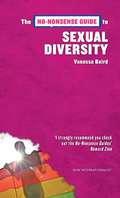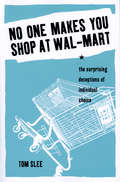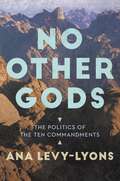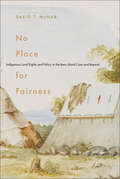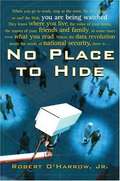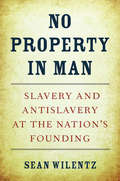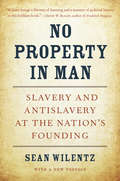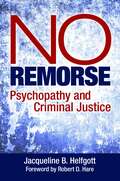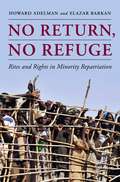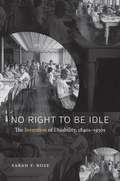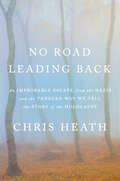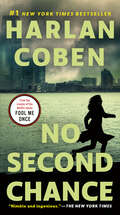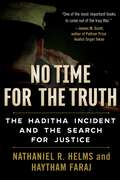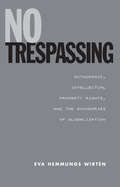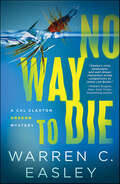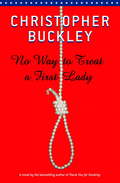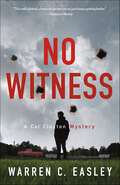- Table View
- List View
The No-Nonsense Guide to Sexual Diversity
by Vanessa BairdThe treatment of sexual minorities--whether lesbian, gay, bisexual, or transgender--varies significantly in different parts of the world. In some countries, equal rights have been achieved and progress is being made against discrimination; in others, being gay still incurs the death penalty.This guide examines all the colors of the sexual rainbow, unearths hidden histories, and looks at contributions from medicine and science. It also includes a unique global survey of laws that affect sexual minorities. Vanessa Baird has been co-editor at New Internationalist magazine since 1986. Her previous books include, as compiler and editor, Eye to Eye Women.
No One Makes You Shop at Wal-Mart: The Surprising Deceptions of Individual Choice
by Tom SleeWe live in a culture of choice. But, in an age of corporate dominance, our freedom to choose has taken on new meaning. Upset with your local big box store? Object to unfair hiring practices at your neighbourhood fast food restaurant? Want to protest the opening of that new multinational coffeeshop? Vote with your feet! What if it’s not that simple? In No One Makes You Shop at Wal-Mart, Tom Slee unpacks the implications of our fervent belief in the power of choice. Pointing out that individual choice has become the lynchpin of a neoconservative corporate ideology he calls MarketThink, he urges us to re-examine our assumptions. Slee makes use of game theory to argue that individual choice is not inherently bad. Nor is it the societal fix-all that our corporations and governments claim it is. A spirited treatise, this book will make you think about choice in a whole new way.
No Other Gods: The Politics Of The Ten Commandments
by Ana Levy-LyonsAna Levy-Lyons, a minister who is equally at home in secular and religious worlds, offers a deeply perceptive reinterpretation of the Ten Commandments for our modern lives. The Ten Commandments are a spiritual resource for social justice. A politically and spiritually brazen prescription for living, the Ten Commandments would turn our world upside down if we actually followed them. Far from being only ethical norms on which everyone already agrees or a remnant of a bygone oppressive era, the Commandments are actually countercultural practices. Today the Ten Commandments are a divisive part of American culture. Religious conservatives champion them, even if they don't always practice them. Religious liberals and the nonreligious may bristle at what they perceive as antiquated moral restrictions. But, this ancient code still has vital contemporary relevance. Rev. Levy-Lyons explores ways the Commandments bring us meaning, illuminate our values, and help us navigate through the turbulent waters of social injustice, environmental crises, and societal inequity. NO OTHER GODS looks at each Commandment in new ways, moving beyond interpersonal morality to the global economy and our hyper-connected age. From the first, You Shall Have No Other Gods Besides Me (Dethrone the Modern Deities of Political, Social, and Corporate Power), to the tenth Do Not Covet (Practice Your Liberation-You Have Enough, You Are Enough)-and all those in between-she underscores how the Commandments can produce a bold spiritual consciousness. Whether you are deeply religious or spiritual-but-not-religious, learn how the Ten Commandments can guide you to resist injustice, heal our earth, and find personal dignity amid the free-for-alls of modern life. "We don't have to invent a bunch of new practices for a meaningful way to live out our spirituality and social justice politics," says Levy-Lyons. "There is a perfectly good set of ten of them, all ready to go, with as much progressive firepower as any of us can handle, that has existed for some three thousand years."
No Pity
by Joseph P. ShapiroPeople with disabilities forging the newest and last human rights movement of the century.From the Trade Paperback edition.
No Place for Fairness
by David T. McnabAboriginal land policy in Canada began as an Aboriginal initiative. In No Place for Fairness, David McNab - a long time advisor on land and treaty rights for both government and First Nations groups - looks at the Bear Island Indigenous rights case, initiated by the Teme-Augama Anishinabe, to explore why governments fail to deal effectively with Aboriginal land claims. The book, divided into two sections, includes a survey of the historical background of the Bear Island claim followed by a more personal series of reflections about what happened as the claim encountered decades of policy hurdles, court cases, public protests, and above all resistance by the Temagami First Nation. McNab provides details of how ministers and their senior officials resisted real efforts to resolve problems as well as examples of field staff resisting government attempts at resolution. He also shows that government entities such as the Indian Commission of Ontario and the Native Affairs Directorate were largely used as "mailboxes" where successive federal and provincial governments sent things they wanted to bury.
No Place for Fairness: Indigenous Land Rights and Policy in the Bear Island Case and Beyond (McGill-Queen's Indigenous and Northern Studies #59)
by David T. McNabAboriginal policy and claims negotiation in Canada is seen to be a murky and perplexing world that has become an important public issue and has significant policy implications for government spending. Aboriginal land policy in Canada began as an Aboriginal initiative. In No Place for Fairness, David McNab - a long time advisor on land and treaty rights for both government and First Nations groups - looks at the Bear Island Indigenous rights case, initiated by the Teme-Augama Anishinabe, to explore why governments fail to deal effectively with Aboriginal land claims. The book, divided into two sections, includes a survey of the historical background of the Bear Island claim followed by a more personal series of reflections about what happened as the claim encountered decades of policy hurdles, court cases, public protests, and above all resistance by the Temagami First Nation. McNab provides details of how ministers and their senior officials resisted real efforts to resolve problems as well as examples of field staff resisting government attempts at resolution. He also shows that government entities such as the Indian Commission of Ontario and the Native Affairs Directorate were largely used as "mailboxes" where successive federal and provincial governments sent things they wanted to bury. No Place for Fairness is the story of what happens when Aboriginal peoples' political rights are crammed into the Euro-Canadian legal system. McNab makes a clear case that a legalistic approach to these problems is wholly inadequate and that more important things - like fairness - must be recognized as paramount if a just and lasting Aboriginal land policy is to be created.
No Place to Hide
by Robert O'Harrow Jr.An award-winning reporter for The Washington Post, O'Harrow reviews some of the surveillance and identification technologies and procedures now being used by corporations and governments against the American people. He begins with the flood of measures adopted during the six weeks after the September 2001 attacks. Other topics include the data revolution, Total Information Awareness, and the government's eyes and ears. Annotation ©2007 Book News, Inc., Portland, OR (booknews.com)
No Property in Man: Slavery and Antislavery at the Nation's Founding (The Nathan I. Huggins lectures #18)
by Sean WilentzDriving straight to the heart of the most contentious issue in American history, Sean Wilentz argues controversially that, far from concealing a crime against humanity, the U.S. Constitution limited slavery’s legitimacy—a limitation which in time inspired the antislavery politics that led to Southern secession, the Civil War, and Emancipation.
No Property in Man: Slavery and Antislavery at the Nation’s Founding, With a New Preface (The Nathan I. Huggins Lectures #18)
by Sean WilentzDriving straight to the heart of the most contentious issue in American history, Sean Wilentz argues controversially that, far from concealing a crime against humanity, the U.S. Constitution limited slavery’s legitimacy—a limitation which in time inspired the antislavery politics that led to Southern secession, the Civil War, and Emancipation.
No Remorse: Psychopathy and Criminal Justice
by Jacqueline B. HelfgottPsychopathy and Criminal Justice provides a comprehensive examination of the empirical research and cultural understanding of psychopathy. The book examines ways in which the construct and concept of psychopathy have made their way into criminological theory and criminal justice practice.<p><p>It offers a focused look at how the term "psychopath" is used and understood in law enforcement, the courts, corrections, victim services, and juvenile justice. Additionally, it examines historical, research, and cultural perspectives on psychopathy for understanding criminal behavior, exploring theories of and research into psychopaths, psychopathy and gender, and representations of psychopaths in film and literature.
No Return, No Refuge: Rites and Rights in Minority Repatriation
by Howard Adelman Elazar BarkanRefugee displacement is a global phenomenon that has uprooted millions of individuals over the past century. In the 1980s, repatriation became the preferred option for resolving the refugee crisis. As human rights achieved global eminence, refugees' right of return fell under its umbrella. Yet return as a right and its practice as a rite created a radical disconnect between principle and everyday practice, and the repatriation of refugees and Internally Displaced Persons (IDPs) remains elusive in cases of forced displacement of victims by ethnic conflict.Reviewing cases of ethnic displacement throughout the twentieth century in Europe, Asia, and Africa, Howard Adelman and Elazar Barkan juxtapose the empirical lack of repatriation in cases of ethnic conflict, unless accompanied by coercion. The emphasis on repatriation during the last several decades has obscured other options, leaving refugees to spend years warehoused in camps. Repatriation takes place when identity, defined by ethnicity or religion, is not at the center of the displacing conflict, or when the ethnic group to which the refugees belong are not a minority in their original country or in the region to which they want to return. Rather than perpetuate a ritual belief in return as a right without the prospect of realization, Adelman and Barkan call for solutions that bracket return as a primary focus in cases of ethnic conflict.
No Right To Be Idle: The Invention Of Disability, 1850-1930
by Sarah F. Rose<P><P>During the late nineteenth and early twentieth centuries, Americans with all sorts of disabilities came to be labeled as "unproductive citizens." Before that, disabled people had contributed as they were able in homes, on farms, and in the wage labor market, reflecting the fact that Americans had long viewed productivity as a spectrum that varied by age, gender, and ability. But as Sarah F. Rose explains in No Right to Be Idle, a perfect storm of public policies, shifting family structures, and economic changes effectively barred workers with disabilities from mainstream workplaces and simultaneously cast disabled people as morally questionable dependents in need of permanent rehabilitation to achieve "self-care" and "self-support." <P><P> By tracing the experiences of policymakers, employers, reformers, and disabled people caught up in this epochal transition, Rose masterfully integrates disability history and labor history. She shows how people with disabilities lost access to paid work and the status of "worker--a shift that relegated them and their families to poverty and second-class economic and social citizenship. This has vast consequences for debates about disability, work, poverty, and welfare in the century to come.
No Road Leading Back: An Improbable Escape from the Nazis and the Tangled Way We Tell the Story of the Holocaust
by Chris HeathThis by turns shattering and hope-giving account of prisoners who dug their way to freedom from the Nazis is both a stunning escape narrative and an object lesson in the ways we remember and continually forget the particulars of the Holocaust.No Road Leading Back is the remarkable story of a dozen prisoners who escaped from the site where more than 70,000 Jews were shot in the Lithuanian forest of Ponar after the Nazi invasion of Eastern Europe in 1941. Anxious to hide the incriminating evidence of the murders, the S.S. later in the war enslaved a group of Jews to exhume every one of the bodies and incinerate them all in a months-long labor—an episode whose specifics are staggering and disturbing, even within the context of the Holocaust.From within that dire circumstance emerges the improbable escape made by some of the men, who dug a tunnel with bare hands and spoons while they were trapped and guarded day and night—an act not just of bravery and desperation but of awesome imagination. Based on first-person accounts of the escapees and on each scrap of evidence that has been documented, repressed, or amplified since, this book resurrects their lives, while also providing a complex, urgent analysis of why their story has rarely been told, and never accurately. Heath explores the cultural use and misuse of Holocaust testimony and the need for us to face it—and all uncomfortable historical truths—with honesty and accuracy.
No Safe Place: Toxic Waste, Leukemia and Community
by Phil Brown Edwin J. MikkelsenThis book documents the suffering and the difficulties born out of the Woburn case. It offers a clinical, yet compassionate glimpse into the minds of people for whom environmental contamination meant severe illness and often death and holds out a hope that through communal support and political action the world can be made a safer place.
No Seat at the Table: How Corporate Governance and Law Keep Women Out of the Boardroom (Critical America #26)
by Douglas M. BransonWomen are completing MBA and Law degrees in record high numbers, but their struggle to attain director positions in corporate America continues. Although explanations for this disconnect abound, neither career counselors nor scholars have paid enough attention to the role that corporate governance plays in maintaining the gender gap in America's executive quarters.Mining corporate governance models applied at Fortune 500 companies, hundreds of Title VII discrimination cases, and proxy statements, Douglas M. Branson suggests that women have been ill-advised by experts, who tend to teach females how to act like their male, executive counterparts. Instead, women who aspire to the boardroom should focus on the decision-making processes nominating committees—usually dominated by white men—employ when voting on membership.Filled with real-life cases, No Seat at the Table opens the closed doors of the boardroom and reveals the dynamics of the corporate governance process and the double standards that often characterize it. Based on empirical evidence, Branson concludes that women have to follow different paths than men in order to gain CEO status, and as such, encourages women to make flexible, conscious, and often frequent shifts in their professional behaviors and work ethics as they climb the corporate ladder.
No Second Chance
by Harlan CobenWhen the first bullet hit my chest, I thought of my daughter... Dr. Marc Seidman has been shot twice, his wife has been murdered, and his six-month-old daughter has been kidnapped.<P><> When he gets the ransom note-he knows he has only one chance to get this right. But there is nowhere he can turn and no one he can trust.
No State Shall Abridge: The Fourteenth Amendment and the Bill of Rights
by Michael Kent Curtis"The book is carefully organized and well written, and it deals with a question that is still of great importance--what is the relationship of the Bill of Rights to the states."--Journal of American History"Curtis effectively settles a serious legal debate: whether the framers of the 14th Amendment intended to incorporate the Bill of Rights guarantees and thereby inhibit state action. Taking on a formidable array of constitutional scholars, . . . he rebuts their argument with vigor and effectiveness, conclusively demonstrating the legitimacy of the incorporation thesis. . . . A bold, forcefully argued, important study."--Library Journal
No Stone Unturned: The True Story of the World's Premier Forensic Investigators
by Steve JacksonThe New York Times bestselling author takes readers on &“a fascinating journey into the trenches of crime [investigation]&”—now revised and updated (Lowell Cauffiel, New York Times bestselling author).A body stuffed in a car trunk swallowed by the swirling, muddy waters of the Missouri River. A hiker brutally murdered, then thrown off a steep embankment in a remote mountain range. A devious killer who hid his wife&’s body under a thick cement patio. For investigators, the story is often the same: they know a murder took place, they may even know who did it; but without key evidence, or a body, pursuing a conviction is nearly impossible. That&’s when they call NecroSearch International, a brain trust of the nation&’s top scientists in a wide variety of fields, who along with law enforcement, use the latest technology and field techniques to locate clandestine graves and hidden secrets to solve &“unsolvable&” crimes. In No Stone Unturned, Steve Jackson—who became a member of NecroSearch International in 2015—gives a captivating, insider&’s look into a realm of crime investigation of which few people are aware. &“The book covers the group&’s quirky beginnings and digs into its most important cases suspensefully; Jackson&’s sharp eye misses nothing in the painstakingly rendered details. A must-have for true crime fans, it should also be of great interest to anyone fascinated with the practical applications of science.&”—Publishers Weekly (starred review)&“Delves into cases that would make good novels, but they&’re real. Furthermore, he describes a group of uncommon people performing uncommon tasks, and he does it with respect, accuracy and genuine style.&”—Ron Franscell, bestselling author of Alice & Gerald: A Homicidal Love Story
No Timber Without Trees: Sustainability in the tropical forest (Natural Resource Management Set)
by Duncan PooreMuch of the world's tropical timber is still supplied from natural forest, but under current systems of management the forests are rapidly becoming exhausted. Unless management practices change to become genuinely sustainable, neither the forests nor the essential contribution of the timber industry to many economies will survive. Duncan Poore reviews the extent to which natural forests are already being sustainably managed for timber production, and looks at how these practices can be enlarged. He places management for timber in the wider context of tropical forest conservation and outlines a strategy for further action. Thoroughly researched and accessibly written, this book will be useful for everyone working or interested in the subject of tropical forests. Foreword by Dato Dr B.C.Y. Freezailah Originally published in 1989
No Time for the Truth: The Haditha Incident and the Search for Justice
by Nathaniel R. Helms Haytham FarajAn Unflinching Look at a Black Chapter in Our War in Iraq and America’s Failure to Serve Justice In the waning days of 2005, twelve Marines were ambushed by Sunni Muslim insurgents on Route Chestnut, an ancient Mesopotamian road at the south edge of Haditha, Iraq, when an IED detonated under one of four Humvees they occupied, killing or wounding a quarter of their number. The surviving Marines quickly counterattacked. Their merciless response killed twenty-four Iraqi citizens, including an old man and ten women and children. This horrific encounter was quickly dubbed the Haditha Massacre and compared to My Lai, and its echoes still resonate today. Prompted by international condemnation, the Pentagon and Marine Corps initiated court-martial proceedings against the Marines involved.No Time for the Truth is the first book to show how the subsequent seven-year investigation and trial?which resulted in only a single minor conviction?was no more than theater meant to appease an outraged public and salvage US-Iraq relations. Authors Nathaniel Helms and Haytham Faraj, who served as defense counsel, reveal how the Pentagon pressured prosecutors to protect the integrity of the Marine Corps by hiding the fully gruesome nature of killings perpetrated by ?battle-rattled” soldiers, with the intention of laying blame at the feet of a single staff sergeant. This is a stunning account of one of the darkest moments in the war in Iraq, a critical examination of whether justice was even sought after, and a powerful statement that in war, "truth is the first casualty.”Skyhorse Publishing, as well as our Arcade imprint, are proud to publish a broad range of books for readers interested in history—books about World War II, the Third Reich, Hitler and his henchmen, the JFK assassination, conspiracies, the American Civil War, the American Revolution, gladiators, Vikings, ancient Rome, medieval times, the old West, and much more. While not every title we publish becomes a New York Times bestseller or a national bestseller, we are committed to books on subjects that are sometimes overlooked and to authors whose work might not otherwise find a home.
No Trespassing
by Eva Hemmungs WirténIn this scholarly yet highly accessible work, Eva Hemmungs Wirtén traces three main themes within the scope of cultural ownership: authorship as one of the basic features of print culture, the use of intellectual property rights as a privileged instrument of control, and finally globalization as a pre-condition under which both operate. Underwritten by rapid technological change and increased global interdependence, intellectual property rights are designed to protect a production that is no longer industrial, but informational.No Trespassing tells the story of a century of profound change in cultural ownership. It begins with late nineteenth-century Europe, exploring cultural ownership in a number of settings across both spatial and temporal divides, and concludes in today's global, knowledge-based society. Wirtén takes an interdisciplinary and international approach, using a wide array of material from court cases to novels for her purposes. From Victor Hugo and the 1886 Berne Convention, to the translation of Peter Høeg?s bestseller Smilla's Sense of Snow, Wirtén charts a history of Intellectual property rights and regulations. She addresses the relationship between author and translator, looks at the challenges to intellectual property by the arrival of the photocopier, takes into account the media conglomerate's search for content as a key asset since the 1960s, and considers how a Western legal framework interacts with attempts to protect traditional knowledge and folklore. No Trespassing is essential reading for all who care about culture and the future regulatory structures of access to it.
No Undocumented Child Left Behind: Plyler v. Doe and the Education of Undocumented Schoolchildren (Citizenship and Migration in the Americas #3)
by Michael A. OlivasThe 1982 U. S. Supreme Court case of Plyler v. Doe, which made it possible for undocumented children to enroll in Texas public schools, was a watershed moment for immigrant rights in the United States. The Court struck down both a state statute denying funding for education to undocumented children and a municipal school district's attempt to charge an annual $1,000 tuition fee for each undocumented student to compensate for the lost state funding. Yet while this case has not returned to the Supreme Court, it is frequently contested at the state and local level.In No Undocumented Child Left Behind, Michael A. Olivas tells a fascinating history of the landmark case, examining how, 30 years later, Plyler v. Doe continues to suffer from implementation issues and requires additional litigation and vigilance to enforce the ruling. He takes a comprehensive look at the legal regime it established regarding the education of undocumented school children, moves up through its implementation, including direct and indirect attacks on it, and closes with the ongoing, highly charged debates over the Development, Relief, and Education for Minors (DREAM) Act, which aims to give conditional citizenship to undocumented college students who graduated from US high schools and have been in the country for at least five years. Listen to Michael Olivas on WYPF 88.1 FM, as he takes a look back 30 years to the Supreme Court case that made it possible for undocumented children to enroll in public schools and the highly-charged political and legal battles that have ensued.
No Way to Die (Cal Claxton Mysteries #7)
by Warren C EasleyWhen nothing is as it seems, can the truth survive?Attorney Cal Claxton, now well-established in his Oregon law practice after breaking off his career as a high-powered LA prosecutor, just wants to go fishing with his daughter, Claire, and he knows the best place—the coastal area south of Coos Bay. But their vacation takes a dark turn with the discovery of a body in the river.As an investigation is launched into the suspicious death, Cal and Claire find themselves drawn into the life of the local bookshop owner and vocal environmental activist, whose grandson was convicted for murder at age sixteen. She believes he was wrongly accused and convinces Cal to reexamine the case. Together, Cal and Claire dig deep into the secrets and crumbling alliances that form the foundation of this small coastal community, and what they find could spell doom for them both...
No Way To Treat a First Lady: A Novel
by Christopher BuckleyA New York Times Notable Book of the YearElizabeth Tyler MacMann, the ambitious First Lady of the United States (and known in the tabloids as "Lady Bethmac"), is on trial for the death of her philandering husband, and the only man who can save her is the boyfriend she jilted in law school--now the most shameless defense attorney in America. Published to rave reviews, No Way to Treat a First Lady is a hilariously warped love story for our time set in the funniest place in America: Washington, D.C.
No Witness: A Cal Claxton Mystery (Cal Claxton Mysteries #8)
by Warren C EasleyWhen the American Dream becomes a nightmare…Running a one-man law practice in the heart of Oregon's wine country, Cal Claxton hires a young, undocumented man as an assistant, hoping to give him an opportunity to create more stability for himself and his family. Timoteo Fuentes is a bright, hardworking student by day and Cal's legal clerk by night, juggling both roles with determination and grit. When one of Timoteo's family members is brutally murdered, the migrant community is reluctant to cooperate with the police investigation for fear of deportation.Devastated by the loss and nervous about engaging with the legal system, the family turns to Cal for help. With Timoteo protected as a "Dreamer" from deportation, the two begin a dangerous investigation of ruthless people who leverage the fear of a vulnerable population for profit and an assassin who is as cunning as he is deadly. Can Cal and Timoteo untangle the web of deceit or will they become victims themselves?
